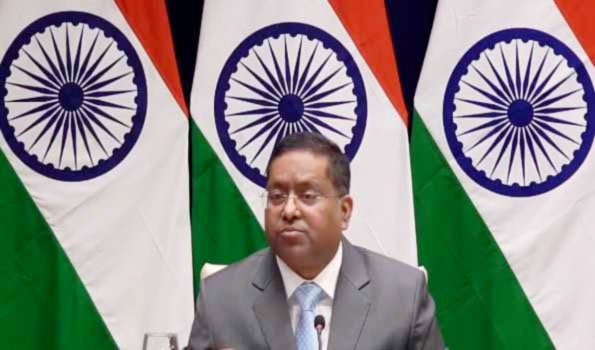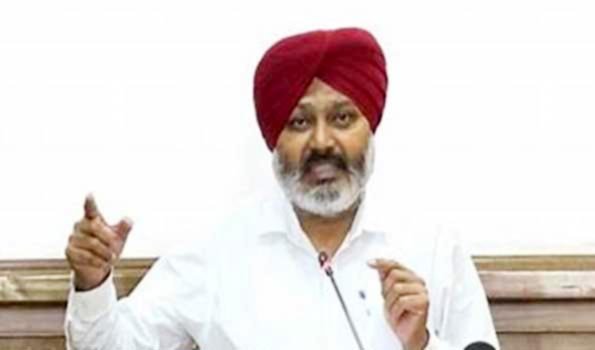New Delhi, May 9 (UNI) India on Thursday said that Canada has shared “no specific or relevant evidence or information” regarding the arrest of three Indian men for alleged involvement in the killing of separatist Hardeep Singh Nijjar, and added that the matter is being “pre-judged” by Ottawa.
Ministry of External Affairs spokesperson Randhir Jaiswal, answering a query on the matter during his briefing, said: “Let me first make it clear that no specific or relevant evidence or information has been shared by the Canadian authorities till date with us.
“You will, therefore, understand our view that the matter is being pre-judged when the people say X or Y. Obviously, there are political interests at work. We have long maintained that separatists, extremists and those advocating violence have been given a political space in Canada,” the spokesperson said.
“Our diplomats have been threatened with impunity, and obstructed in their performance of duties. We’ve also pointed out to the Canadian authorities that figures associated with organised crime with links in India have been allowed entry and residency. Many of our extradition requests are pending with them. We’re having discussions at the diplomatic level on all these matters with the Canadian side,” he added.
His response comes as the Canadian authorities on last Friday charged three Indian nationals – Kamalpreet Singh, Karanpreet Singh and Karan Brar – with the murder of Khalistani separatist Nijjar last year in June. The three had reportedly entered Canada on student visas.
The three men face first-degree murder and conspiracy charges in the Nijjar case.
The MEA spokesperson’s statement comes as India on Tuesday hit out at Canada for providing a “safe haven” and political space to criminal and “secessionist” elements, after pro-Khalistan elements shouted anti-India slogans and displayed anti-India graffiti and posters at a religious parade in Ontario’s Malton area.
In Tuesday’s statement, India said that “Celebration and glorification of violence should not be a part of any civilized society. Democratic countries which respect the rule of law should not allow intimidation by radical elements in the name of freedom of expression”, referring to the pandering of Khalistani elements by Canada.
On May 4, during an interaction with journalists in Odisha, External Affairs Minister S Jaishankar had said that Canada has been welcoming a number of gangland people with organised crime links from Punjab and ignoring Indian warnings against giving them visa, and therefore killings like that of separatist Hardeep Singh Nijjar is an issue that Ottawa has to worry about.
Asked about the arrest of three Indian nationals with regard to the killing of Khalistani separatist Nijjar in British Columbia last year, EAM Jaishankar said he had seen the report about the arrests: “I also saw this report; okay somebody may have been arrested, their police may have done some investigation, but the fact is the number of gangland people, the number of people with organised crime links from Punjab, have been made welcome in Canada. We have been telling Canada that these are wanted criminals from India, you are giving them visa; many have come on false documentation, and yet you allow them to live there. If you decide to import people with negative backgrounds there will be issues. “
Jaishankar also said that the Khalistani elements have organised themselves politically in Canada and become a political lobby.
“And in some of these democratic countries the politicians of those countries are made to believe that if they defer to these people or pander to these people, these people have some ability to get the community to support them,” he said, in reference to Canadian PM Justin Trudeau, who has taken the support of NDP Leader Jagmeet Singh, who is a Khalistan sympathiser. Canada is known to have the second highest Sikh population in the world, after India, at over 770,000, or about two % of its total population.
EAM said these separatist elements “have tried to create space for themselves in the politics of these countries”.
“At this time, I would say it is not so much of a problem in the US; our biggest problem right now is in Canada. Because in Canada, actually, the party in power in Canada, other parties in Canada, have given these kinds of extremism, separatism and advocates of violence a certain legitimacy, in the name of free speech.”
On Tuesday, Canadian Immigration Minister Marc Miller denied External Affairs Minister S Jaishankar’s statement that Ottawa has been ignoring Indian warnings and welcoming a number of gangland people with organised crime links from Punjab into the country.
Asked by journalists if the Justin Trudeau government has been lax about who it lets into the country as the EAM has said, Miller said: “We are not lax and the Indian foreign minister is entitled to his opinion.”
Asked again, he said:
“Let him speak his mind, it is just not accurate.”
Asked if the three Indians arrested in the killing of Hardeep Singh Nijjar were in Canada on student visas, he refused to confirm.
“I can’t (confirm). This is information I can’t share with you at this time. It is an ongoing police investigation. The questions lie properly with the RCMP (Royal Canadian Mounted Police),” Miller said.











